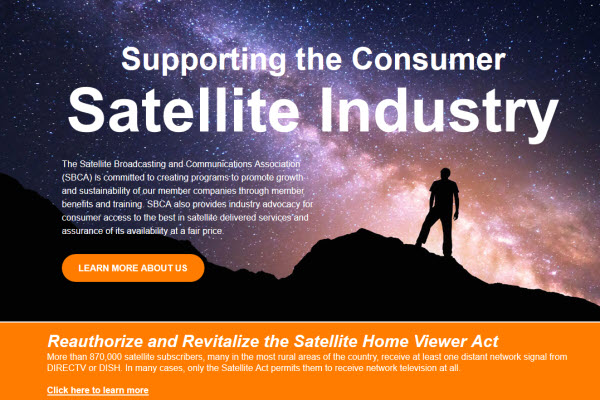SBCA Pushes Permanent STELAR Renewal

The smarter way to stay on top of broadcasting and cable industry. Sign up below
You are now subscribed
Your newsletter sign-up was successful
Satellite operators have begun pushing the Hill to renew satellite compulsory license legislation, the Satellite Television Extension and Localism Act Reauthorization (STELAR), preferably permanently.
The current license, which allows satellite operators to import distant TV network signals for a blanket fee rather than having to negotiate retrans--must be extended by the end of 2019 or it goes away (it has a five-year sunset).
Broadcasters last week fired an early warning shot across the bow at MVPDS, saying that the law was passed 30 years ago to help small satellite operators compete with big cable monopolies, but now AT&T-DirecTV and DISH are multi-billion dollar companies with no excuse for getting the compulsory license price break, and almost all satellite customers get their local TV stations now that DBS operators are delivering local-into-local in virtually all markets.
Related: NAB Launches Fight Against STELAR Renewal
But not all markets have all the Big Four network affiliates, particularly smaller and rural markets, a point the Satellite Broadcasting & Communications Association (SBCA) is making in a talking points memo being circulated on the Hill and posted on its Web site.
SBCA also points to others who benefit from the distant-signal license.
"Hundreds of thousands of mostly rural American homes, along with long-haul truckers, RV and camping enthusiasts and tailgating sports fans, rely on satellite technology to provide them with access to network TV service that many other technologies cannot offer," they said in the one-sheet.
The smarter way to stay on top of broadcasting and cable industry. Sign up below
SBCA says that at least 870,000 satellite subs get at least one distant signal from DirecTV or DISH. Letting STELAR sunset would "remove channels from people who legally receive them today..."
Some have have argued that MVPDs could still get access to TV station signals through private negotiations and SBCA says that would be OK, but only under the kind of broad deregulation proposed by Rep. Steve Scalise (R-La.), which would include eliminating the retrans/must-carry regime, something broadcasters would fight tooth and nail.
SBCA also frames its support of reauthorizing STELAR as an issue of fairness. It says the license must be renewed so that a largely rural audience can get the same network programming as the rest of the country and will not be deprived of programming they have relied on.
The satellite operators say the renewal should be permanent (heretofore it has gotten a series of five-year renewals), again as as issue of fairness, it says, this time leveling the playing field between satellite and cable given that the cable statutory license for delivering TV station signals without individual negotiations--retrans negotiations between MVPDS and TV stations are for the underlying programming, not the signal itself--has no expiration date.
Renewing the satellite license in perpetuity would provide parity. "There is no reason why satellite subs should live with the threat of losing their service every five years, while cable subs face no such harm," SBCA says.
Failing a permanent reauthorization, SBCA said, Congress "must" extend it, as it has done since 1988.
STELAR, which was last renewed 2014, reauthorizes the satellite compulsory distant signal license for five years. But last time around it was also a vehicle for some cable-friendly changes to retrans, including renewing the FCC's enforcement of good faith retrans negotiations and extending the commission's prohibition on coordinated retrans negotiations among noncommonly owned TV stations in a market from the top four to all stations.
Contributing editor John Eggerton has been an editor and/or writer on media regulation, legislation and policy for over four decades, including covering the FCC, FTC, Congress, the major media trade associations, and the federal courts. In addition to Multichannel News and Broadcasting + Cable, his work has appeared in Radio World, TV Technology, TV Fax, This Week in Consumer Electronics, Variety and the Encyclopedia Britannica.

